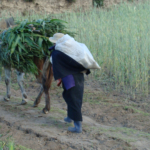


Research Community and Organizational Development Associates
Selian Agricultural Research Institute
Tanzania
12/2015—12/2016
This project addresses the problem of low production because of soil infertility and mono-cropping in Singida District in Tanzania. These factors contribute to food insecurity by reducing access to and quality of food consumed. Soil nutrients are depleted because of increased population and continuous cultivation of land with little or no crop rotation and inadequate addition of external organic and inorganic fertilizers. This project will explore opportunities for legume integration to intensify and diversify production and improve soil fertility, with a focus on the production of pigeonpea. RECODA has introduced pigeonpea in four villages in Singida District. Response has been positive, and farmers are adopting the new technology. The new project will build on this experience and introduce intercropping of pigeonpea or other legumes with sorghum and maize among the small-scale farmers in four other villages in Singida. Farmer groups will be established and facilitated to interact with each other and with researchers and agricultural extension officers in a farmer research network. Pathways of information-sharing will be analyzed, especially in relation to how these pathways affect adoption of the introduced technologies and contribute to sustainability. The project will also seek to understand the gender dynamics that affect adoption of pigeonpea at the household level.
This project aims to identify solutions to low productivity because of soil infertility and mono-cropping that contribute to food and nutrition insecurity in Singida District in Tanzania. It is expected that by the end of the project farmers will have enhanced knowledge of options for improving productivity through legume/cereal intercropping. Lessons will be learned on factors affecting the smooth functioning of farmer research networks. In addition, the most effective ways of generating and sharing information within and between communities will be documented.
